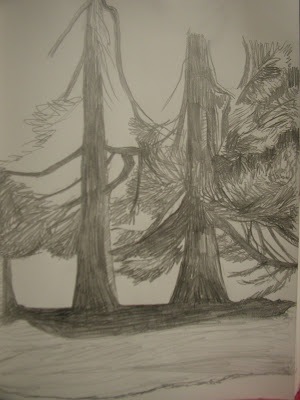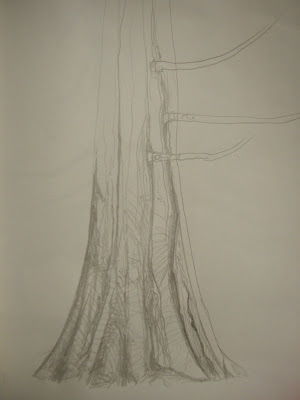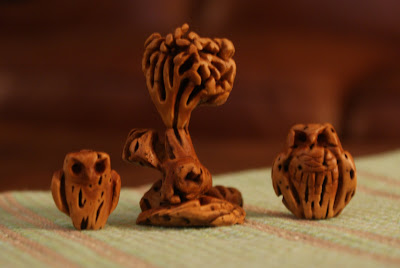I first read of Les Murray, the Australian poet, in an article by Adele Ward in StAR Magazine.It was the Sep./Oct. 2007 issue:

The title of Joseph Pearce's editorial, Whatever Happened to the Catholic Literary Revival? gives you an idea of the issue's theme. It explores the writing of Pavel Chichikov, Michael O' Brien, Ron Hansen, Alice Thomas Ellis, Paul Thigpen and of course Les Murray:

The title of the article refers to this poem by Murray, entitled Poetry and Religion:
Religions are poems. They concert
our daylight and dreaming mind, our
emotions, instinct, breath and native gesture
into the only whole thinking: poetry.
Nothing's said till it's dreamed out in words
and nothing's true that figures in words only.
A poem, compared with an arrayed religion,
may be like a soldier's one short marriage night
to die and live by. But that is a small religion.
Full religion is the large poem in loving repetition;
like any poem, it must be inexhaustible and complete
with turns where we ask Now why did the poet do that?
You can't pray a lie, said Huckleberry Finn;
you can't poe one either. It is the same mirror:
mobile, glancing, we call it poetry,
fixed centrally, we call it a religion,
and God is the poetry caught in any religion,
caught, not imprisoned. Caught as in a mirror
that he attracted, being in the world as poetry
is in the poem, a law against its closure.
There'll always be religion around while there is poetry
or a lack of it. Both are given, and intermittent,
as the action of those birds - crested pigeon, rosella parrot -
who fly with wings shut, then beating, and again shut.
***
Murray has also said somewhere else:
"Religions are big slow poems, while most poems are short, fast religions."
Of his books, I've read Conscious and Verbal, Poems the Size of Photographs, and Learning Human. There are, so far, two poems of his that can securely be counted as two of my all-time favourite poems. One is the Quality of Sprawl, which I will post in its entirety in another post, except for the delicious beginning:
Sprawl is the quality
of the man who cut down his Rolls-Royce
into a farm utility truck,
The other is Noonday Axeman. Every time I read it I'm astonished at its perfection; of its oneness of sound and 'meaning' and image. Such a line as:
made what amounts to a human breach in the silence,
hits you with its own inner force so at one with the words that the silence the poem speaks of takes on this epic scale, in which you the reader are also a partaker; either one of those whose habits have been formed around the avoiding of this stillness and silence, fleeing "...to the cities, maddened by this stillness?" or one of those "...who could live in the presence of silence." This silence is like Tolkien's "long defeat of history". It's the same silence encountered by your great, great Grandfather, and by his great, great Grandfather. The same silence encountered by all figures of history, from Roman emperors to Napoleon Bonaparte to Queen Victoria to the unrecorded nameless orphan slaving in the din of a silence-hating factory.
Coincidentally, the poem has the words, into great silence at the end of one of its stanzas:
then died in their turn, each, after his own fashion,
resigned or agonized, from silence into great silence.
This was written way before the film of course. Interesting. I still haven't seen the documentary yet.
But here's the poem:
Noonday Axeman
By Les Murray
Axe-fall, echo and silence. Noonday silence.
Two miles from here, it is the twentieth century:
cars on the bitumen, powerlines vaulting the farms.
Here, with my axe, I am chopping into the stillness.
Axe-fall, echo and silence. I pause, roll tobacco,
twist a cigarette, lick it. All is still.
I lean on my axe. A cloud of fragrant leaves
hangs over me moveless, pierced everywhere by sky.
Here, I remember all of a hundred years:
candleflame, still night, frost and cattle bells,
the draywheels' silence final in our ears,
and the first red cattle spreading through the hills
and my great-great-grandfather here with his first sons,
who would grow old, still speaking with his Scots accent,
having never seen those highlands that they sang of.
A hundred years. I stand and smoke in the silence.
A hundred years of clearing, splitting, sawing,
a hundred years of timbermen, ringbarkers, fencers
and women in kitchens, stoking loud iron stoves
year in, year out, and singing old songs to their children
have made this silence human and familiar
no farther than where the farms rise into foothills,
and, in that time, how many have sought their graves
or fled to the cities, maddened by this stillness?
Things are so wordless. These two opposing scarves
I have cut in my red-gum squeeze out jewels of sap
and stare. And soon, with a few more axe-strokes,
the tree will grow troubled, tremble, shift its crown
and, leaning slowly, gather speed and colossally
crash down and lie between the standing trunks.
And then, I know, of the knowledge that led my forebears
to drink and black rage and wordlessness, there will be silence.
After the tree falls, there will reign the same silence
as stuns and spurns us, enraptures and defeats us,
as seems to some a challenge, and seems to others
to be waiting here for something beyond imagining.
Axe-fall, echo and silence. Unhuman silence.
A stone cracks in the heat. Through the still twigs, radiance
stings at my eyes. I rub a damp brow with a handkerchief
and chop on into the stillness. Axe-fall and echo.
The great mast murmurs now. The scarves in its trunk
crackle and squeak now, crack and increase as the hushing
weight of the high branches heels outward, and commences
tearing and falling, and the collapse is tremendous.
Twigs fly, leaves puff and subside. The severed trunk
slips off its stump and drops along its shadow.
And then there is no more. The stillness is there
as ever. And I fall to lopping branches.
Axe-fall, echo and silence. It will be centuries
before many men are truly at home in this country,
and yet, there have always been some, in each generation,
there have always been some who could live in the presence of silence.
And some, I have known them, men with gentle broad hands,
who would die if removed from these unpeopled places,
some again I have seen, bemused and shy in the cities,
you have built against silence, dumbly trudging through noise
past the railway stations, looking up through the traffic
at the smoky halls, dreaming of journeys, of stepping
down from the train at some upland stop to recover
the crush of dry grass underfoot, the silence of trees.
Axe-fall, echo and silence. Dreaming silence.
Though I myself run to the cities, I will forever
be coming back here to walk, knee-deep in ferns,
up and away from this metropolitan century,
to remember my ancestors, axemen, dairymen, horse-breakers,
now coffined in silence, down with their beards and dreams,
who, unwilling or rapt, despairing or very patient,
made what amounts to a human breach in the silence,
made of their lives the rough foundation of legends-
men must have legends, else they will die of strangeness-
then died in their turn, each, after his own fashion,
resigned or agonized, from silence into great silence.
Axe-fall, echo and axe-fall. Noonday silence.
Though I go to the cities, turning my back on these hills,
for the talk and dazzle of cities, for the sake of belonging
for months and years at a time to the twentieth century,
the city will never quite hold me. I will be always
coming back here on the up-train, peering, leaning
out of the window to see, on far-off ridges,
the sky between the trees, and over the racket
of the rails to hear the echo and the silence.
I shoulder my axe and set off home through the stillness.
 Image found at: http://en.wikipedia.org/wiki/John_Bosco
Image found at: http://en.wikipedia.org/wiki/John_Bosco













































